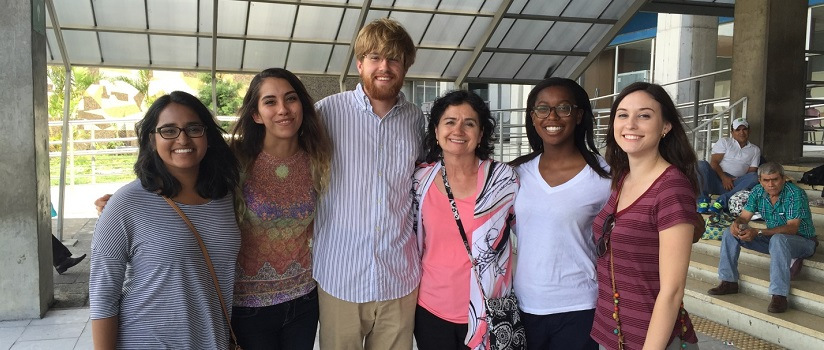August 31, 2016 | Erin Bluvas, bluvase@sc.edu
The USC Study Abroad Office launched its second of four Global USC Programs with a Maymester session in Costa Rica this summer. USC in Costa Rica: Global Health came together as the result of collaborative efforts from disciplines* across the University, including Arnold School Clinical Assistant Professor of Epidemiology and Biostatistics Myriam Torres, who played an instrumental role in the program’s development.
The Costa Rica program, which is based in San José, gives students the opportunity to visit local hospitals, clinics and non-profit organizations to learn about working environments in health-related fields within a global context. It was conceptualized by the USC Study Abroad Office to meet the University’s vision of establishing an active USC presence abroad, allowing students and faculty to contribute to the partner communities in meaningful, interactive and productive ways.
In addition to undergraduate courses in Spanish, geography, and social work, the Arnold School of Public Health rounded out the curriculum by offering a class in Principles of Global Health (HPEB 470) and a graduate-level course in Introduction to Epidemiology (EPID 700). The Principles of Global Health course introduced students to contemporary and historical global health issues.
“In addition to our coursework, we worked with kids in an impoverished neighborhood by conducting a workshop in oral hygiene during a preschool visit," says David Simmons, an associate professor of health promotion, education, and behavior (HPEB) and Associate Dean of Diversity, Equity and Inclusion, who served as a co-instructor for the course. “Our students really benefited from the exchange—getting exposed to a different kind of poverty, culture and language.”
To lay the groundwork for the overall program, USC Study Abroad Office Director Magdalena Grudzinski-Hall engaged a diverse group of USC faculty members to spend a year in strategic planning. She also enlisted a logistics organization to provide assistance with housing, transportation, etc., and she invited Torres to visit Costa Rica with her to help evaluate the existing resources and potential collaborative opportunities in San José.
“During the visit, a physician at a nursing home asked about the possibility of us helping them manage their medical data, which was previously stored in paper format,” says Torres. “After giving it some thought, I was able to incorporate his request into my class as a service learning project.”
The resulting Introduction to Epidemiology course was open to graduate students and USC Honors College undergraduates, including public health major Destiny Byrd. Byrd and the other students in the three-week course helped create a medical database for the nursing home, Hogar Carlos Maria Ulloa. “We were able to create an abstract form to retrieve data from the medical records and then create the database, and all of that was done in Spanish!” says Torres. “I must say that the students showed lots of passion and commitment for the work.”
Even though the Maymester session has ended and students have returned to campus to begin the new academic year, the work continues. Torres is still working with Hogar Carlos Maria Ulloa, which serves 200 patients, to guide the staff through the process of entering the data. Once it’s complete, they will send the data to Torres, who plans to enlist graduate students to assist with the data analysis that they will then share with the center. And Torres is already thinking ahead for future USC in Costa Rica: Global Health courses. She is planning service learning projects that will help establish nutrition and psychology databases for the same nursing home.
Meanwhile, the Global USC Program initiative has plans for expansion as well. What began with one location focusing on language, arts, and humanities (USC in Italy) now includes the Costa Rica program, which began with a Maymester session but will eventually include year-round engagement (e.g., semester programs, fall break, spring break, etc.).
The initiative is also in the process of adding two more sites, each with their own unique focus and each using a slightly different model in order to optimize the strengths and opportunities available at the sites where they are located. USC in Taiwan will launch their first Maymester session in 2017 and will specialize in science, technology, engineering, and mathematics (STEM). The fourth program, USC in the Galapagos, will also commence in 2017. The sustainability-focused program kicks off with a spring break session with plans to begin a semester-long program in the fall.
The Global USC Programs are different from traditional study abroad opportunities because they offer USC faculty and students the opportunity to engage in research and courses in global locations. The students take classes from USC professors and earn USC credits. More importantly, the initiative emphasizes integrated, continual and long-lasting partnerships with local communities and organizations.
“Our vision is to create a USC presence where we are committed to that particular location, collaborating with organizations on the ground to contribute to meaningful work and continuously looking for research opportunities and ways to connect with researchers, clinicians and other local partners,” says Grudzinski-Hall. “Dr. Torres’ epidemiology course is a fantastic example of the vision we have for all four of these programs and what they aspire to be. Her service learning project helped build relationships in the community while providing expertise, as well as practical learning opportunities for students, to assist a local organization with a real need. We’re looking forward to continuing with these types of projects and we expand our presence through Global USC Programs.”
*Courses taught during the 2016 USC in Costa Rica: Global Health Maymester session include:
| Course | Title | Instructors |
|---|---|---|
| HPEB 470 | Principles of Global Health | Ed Frongillo, Spencer Moore, David Simmons |
| SPAN 360 | Spanish for Healthcare Professionals | Ana Cueto |
| GEOG 330 | The Geography of Disasters | Jerry Mitchell |
| SOWK 222 | Social Welfare Institutions, Policies and Programs | Ben Roth |
| EPID 700 | Introduction to Epidemiology | Myriam Torres |
